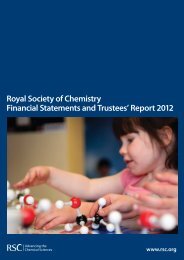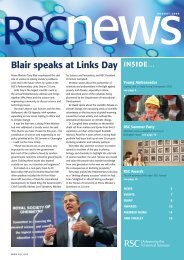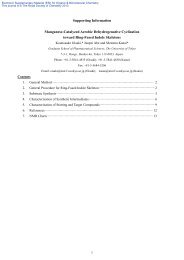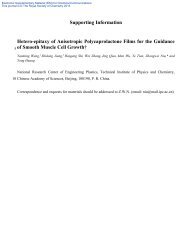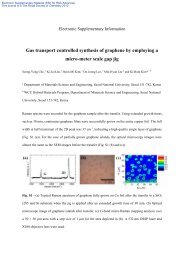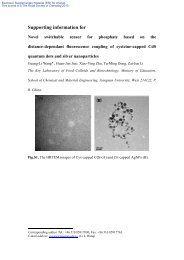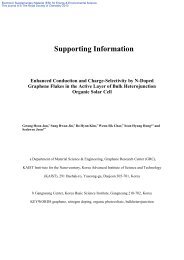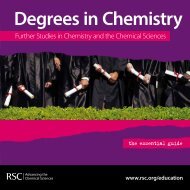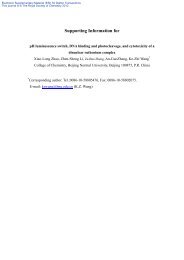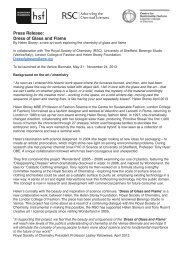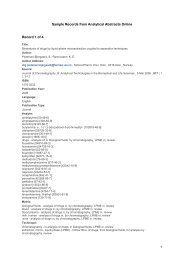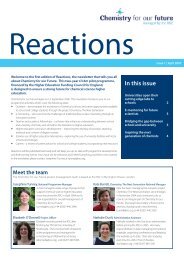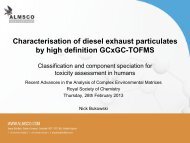RSC News - pp7-14 - Royal Society of Chemistry
RSC News - pp7-14 - Royal Society of Chemistry
RSC News - pp7-14 - Royal Society of Chemistry
Create successful ePaper yourself
Turn your PDF publications into a flip-book with our unique Google optimized e-Paper software.
NEWS<br />
Spotlight on <strong>RSC</strong><br />
Interest Groups<br />
Bio-Organic Group<br />
<strong>RSC</strong> works to influence policy<br />
Sean McWhinnie, <strong>RSC</strong> science policy manager, provides an update <strong>of</strong> the<br />
<strong>RSC</strong>’s science policy initiatives<br />
THE BIO-ORGANIC GROUP is one <strong>of</strong> the<br />
largest Groups within the <strong>RSC</strong> with almost<br />
700 members. The Group’s activities reflect<br />
the rapidly growing interest in bio-organic<br />
chemistry which can be defined as the<br />
application <strong>of</strong> chemical principles and<br />
techniques to solve biological problems. This<br />
encompasses: the synthesis <strong>of</strong> natural<br />
products and other biologically active or<br />
medicinal compounds, the use <strong>of</strong> microorganisms<br />
or enzymes as synthetic reagents<br />
(biotransformations); the biosynthesis <strong>of</strong><br />
secondary metabolites; and the elucidation,<br />
by chemical means, <strong>of</strong> biological pathways<br />
and reaction mechanisms. The development<br />
<strong>of</strong> gene manipulation technology and the<br />
availability <strong>of</strong> genomic information<br />
continuously provide an enormous number<br />
<strong>of</strong> new opportunities for developments in<br />
bio-organic chemistry.<br />
The Group organises various scientific<br />
meetings on behalf <strong>of</strong> its members. In<br />
2003, topics included the chemistry and<br />
applications <strong>of</strong> nucleosides, nucleotides and<br />
nucleic acids as well as recent advances in<br />
the chemistry and biochemistry <strong>of</strong><br />
carbohydrates. A particular highlight <strong>of</strong> the<br />
Group’s calendar is a one-day meeting<br />
featuring 20-minute talks by up to 16 finalyear<br />
postgraduate students, highlighting<br />
novel ideas and fascinating results <strong>of</strong><br />
science at the interface between chemistry<br />
and biology. Meetings for 2004 include:<br />
– <strong>Chemistry</strong> <strong>of</strong> the Cell, University <strong>of</strong><br />
Birmingham, 30 March 2004<br />
– International Symposium on Bio-Organic<br />
<strong>Chemistry</strong> (jointly with IUPAC) University<br />
<strong>of</strong> Sheffield, 28 June – 1 July 2004<br />
– Biennial Autumn Meeting on Bio-Organic<br />
<strong>Chemistry</strong>, University <strong>of</strong> Leicester,<br />
September 2004.<br />
– Postgraduate Meeting, University <strong>of</strong><br />
Leeds, December 2004<br />
● New members <strong>of</strong> the Bio-Organic Group<br />
are always welcome. For details email<br />
Mark Bamford at Mark.J.Bamford@gsk.com<br />
or Stan Roberts at smrsm@liv.ac.uk<br />
For full details about all <strong>of</strong> the Interest<br />
Groups see www.rsc.org/lap/rsccom/dab/<br />
subgroup.htm<br />
THE <strong>RSC</strong>’S ACTIVITIES IN SCIENCE policy range<br />
from liaising with the Research Councils, to<br />
making submissions to the House <strong>of</strong><br />
Commons Science and Technology Select<br />
Committee. For the most part, our agenda is<br />
set for us in terms <strong>of</strong> the policy statements<br />
produced since we are <strong>of</strong>ten responding to<br />
consultation documents from bodies such as<br />
the Higher Education Funding Councils and<br />
government departments or to requests for<br />
evidence from Select Committees. The recent<br />
past has been a particularly busy period as<br />
there have been many consultations dealing<br />
with university funding.<br />
Issues concerning the funding <strong>of</strong> chemistry<br />
in universities have come into particularly<br />
sharp focus over the past few months since<br />
three universities have announced that their<br />
chemistry departments are to be closed. The<br />
reasons for closure vary but the <strong>RSC</strong> believes<br />
that, relative to other subjects, chemistry is<br />
particularly expensive and consequently<br />
bottom-line financial management decisions<br />
tend to affect chemistry adversely. The <strong>RSC</strong> is<br />
currently undertaking research to assess the<br />
true cost <strong>of</strong> chemistry in universities in order<br />
to work out by how much university<br />
chemistry is under funded. We hope to have<br />
the outcome <strong>of</strong> this study in the next few<br />
months.<br />
An on-going area <strong>of</strong> interest for the <strong>RSC</strong> has<br />
been the careers <strong>of</strong> women in academic<br />
chemistry. At present, women represent<br />
almost 40 per cent <strong>of</strong> the undergraduate<br />
intake – a healthy figure relative to physics<br />
and engineering – but the proportion <strong>of</strong><br />
female chemistry pr<strong>of</strong>essors is less than<br />
two per cent. Only civil engineering has a<br />
lower proportion. Two projects carried out<br />
for the <strong>RSC</strong> by Evaluation Associates have<br />
looked at ‘factors affecting the career choices<br />
<strong>of</strong> chemistry graduates’ and at ‘the<br />
recruitment and retention <strong>of</strong> women in<br />
academic chemistry’.<br />
The first study established that retention<br />
was the key issue and that if the position<br />
was to improve enough to make women<br />
want to stay in chemistry, the culture had to<br />
change. The second report, launched in<br />
January 2003, recognised that the difficulties<br />
for women <strong>of</strong> sustaining academic careers,<br />
and progressing to the level which reflects<br />
their abilities, <strong>of</strong>ten relate to the organisation<br />
and culture <strong>of</strong> science, engineering and<br />
technology, and the departments and<br />
institutions in which they work.<br />
The report identifies what it is about the<br />
culture in certain departments and/or<br />
universities that causes women to apply<br />
for and accept posts, and what encourages<br />
them to remain in these departments and/or<br />
universities. Further work is planned in this<br />
area but with a focus on industry.<br />
The <strong>RSC</strong> is also planning policy work with<br />
the Institute <strong>of</strong> Physics during 2004 and<br />
hopes to undertake a joint study looking at<br />
ethnic minorities in chemistry and physics.<br />
Amongst the variety <strong>of</strong> other policy<br />
activities the <strong>RSC</strong> undertakes, liaison with the<br />
research councils forms a major part.<br />
The <strong>RSC</strong>’s most frequent and long standing<br />
contact is with the EPSRC’s <strong>Chemistry</strong><br />
Programme; we also have fruitful<br />
relationships with the Materials and Life<br />
Sciences Interface Programmes through the<br />
Materials <strong>Chemistry</strong> and Chemical Biology<br />
Forums. The <strong>RSC</strong> has increasing contact with<br />
the BBSRC, and hopes to develop a stronger<br />
relationship with NERC now that the<br />
Environment, Sustainability and Energy Forum<br />
has been established.<br />
Another major policy activity is being<br />
overseen by the Environment, Health and<br />
Safety Committee. This committee is<br />
coordinating the <strong>RSC</strong>’s response to the<br />
European Commission’s proposed REACH<br />
regulations (see article on page 5).<br />
The <strong>RSC</strong> is currently working on a policy in<br />
respect <strong>of</strong> the proposed European Research<br />
Council so that our views are clear in advance<br />
<strong>of</strong> any future consultation on the issues. The<br />
<strong>RSC</strong> intends to develop policy in a range <strong>of</strong><br />
other areas over the coming months.<br />
● Full details <strong>of</strong> all the <strong>RSC</strong>’s policy<br />
activities can be found at<br />
www.rsc.org/lap/polacts/polindex.htm<br />
● If you have any comments or questions,<br />
please contact Sean McWhinnie at<br />
Burlington House (address on page 16) or<br />
email mcwhinnies@rsc.org<br />
4 <strong>RSC</strong> NEWS<br />
WWW.<strong>RSC</strong>.ORG



